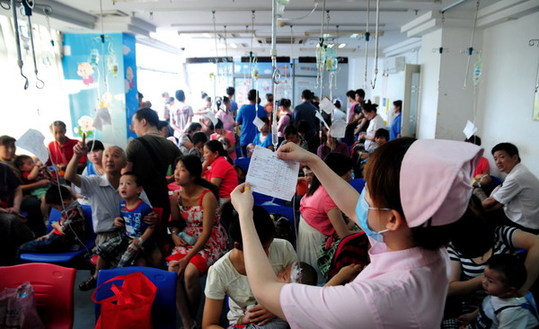
|
 |
|
Children are put on drip in the crowded transfusion room of the pediatrics department at the Huangshi Central Hospital in Hubei province in June. [Photo/China Daily] |
In the latest move to tackle the problem, the Ministry of Health has launched a nationwide surveillance system to document cases of antibiotic-resistant bacteria at 1,349 large public hospitals across the mainland.
There will also be closer monitoring of the system that keeps track of doctors' prescriptions of antibiotics at public hospitals.
And tough new regulations to control the clinical use of antibiotics will take effect on Aug 1.
The moves come days after the World Health Organization weighed in on the growing threat from worldwide antibiotic-resistant gonorrhea. In a statement, the WHO warned that millions of people with gonorrhea could be at risk of running out of treatment options unless urgent action is taken.
Several countries, including Australia, France, Japan, Norway and Sweden, have reported cases of resistance to cephalosporin antibiotics - the last treatment option against the sexually-transmitted disease.
"Antibiotic resistance has no borders, and curbing its misuse is a responsibility shared by all," said Zhao Minggang, deputy director of the department of medical administration under the ministry.
"The ministry's latest initiative will help health authorities to accurately track the use of antibiotic drugs in real time and detect potential cases of antibiotic resistance as soon as possible to better guide clinical drug use in general."
Zhao said it usually takes 10 years to develop new antibiotics, but bacterial resistance develops within two years, largely due to antibiotic abuse.
The ministry estimates that an average of 138 grams of antibiotics are used per person on the mainland each year, nearly 10 times the amount in the United States.
Seventy percent of inpatients and 50 percent of outpatients have prescriptions for antibiotics, according to the ministry.
"Without intervention, there may come a time when there are no effective antibiotics left," Zhao said.
Xiao Yonghong, an expert with the Institute of Clinical Pharmacology at Peking University, said at least 80 percent of the antibiotics used on the mainland are not necessary.
"This drives up medicine costs for the patients and the country," Xiao said. "This helps speed up the development of germs resistant to antibiotics, which might cost lives and jeopardize human safety and health."
Xiao said antibiotic resistance is now widespread on the Chinese mainland but the types of antibiotics, and the severity of the issue, vary regionally.


 Washington to remain focused on Asia-Pacific
Washington to remain focused on Asia-Pacific RQFII target blue chips amid bear market
RQFII target blue chips amid bear market Australian recall for top two exporters
Australian recall for top two exporters China fears new car restrictions
China fears new car restrictions